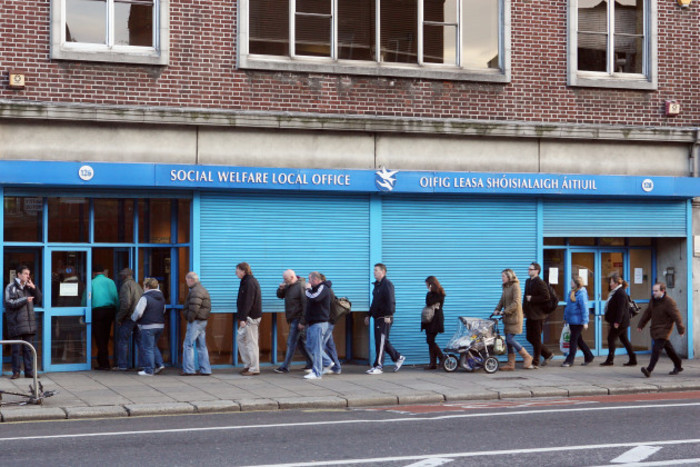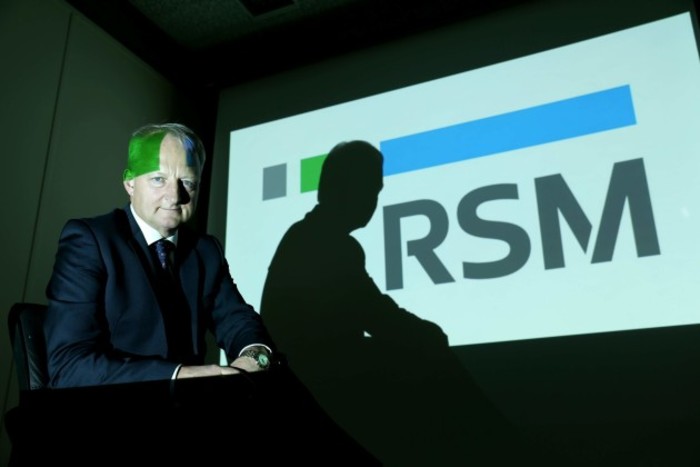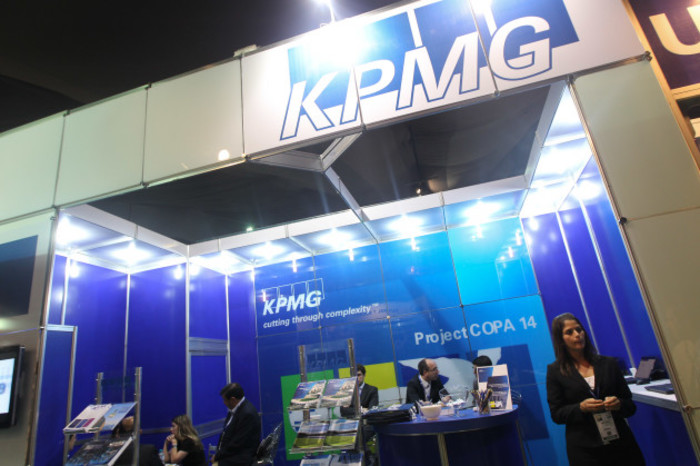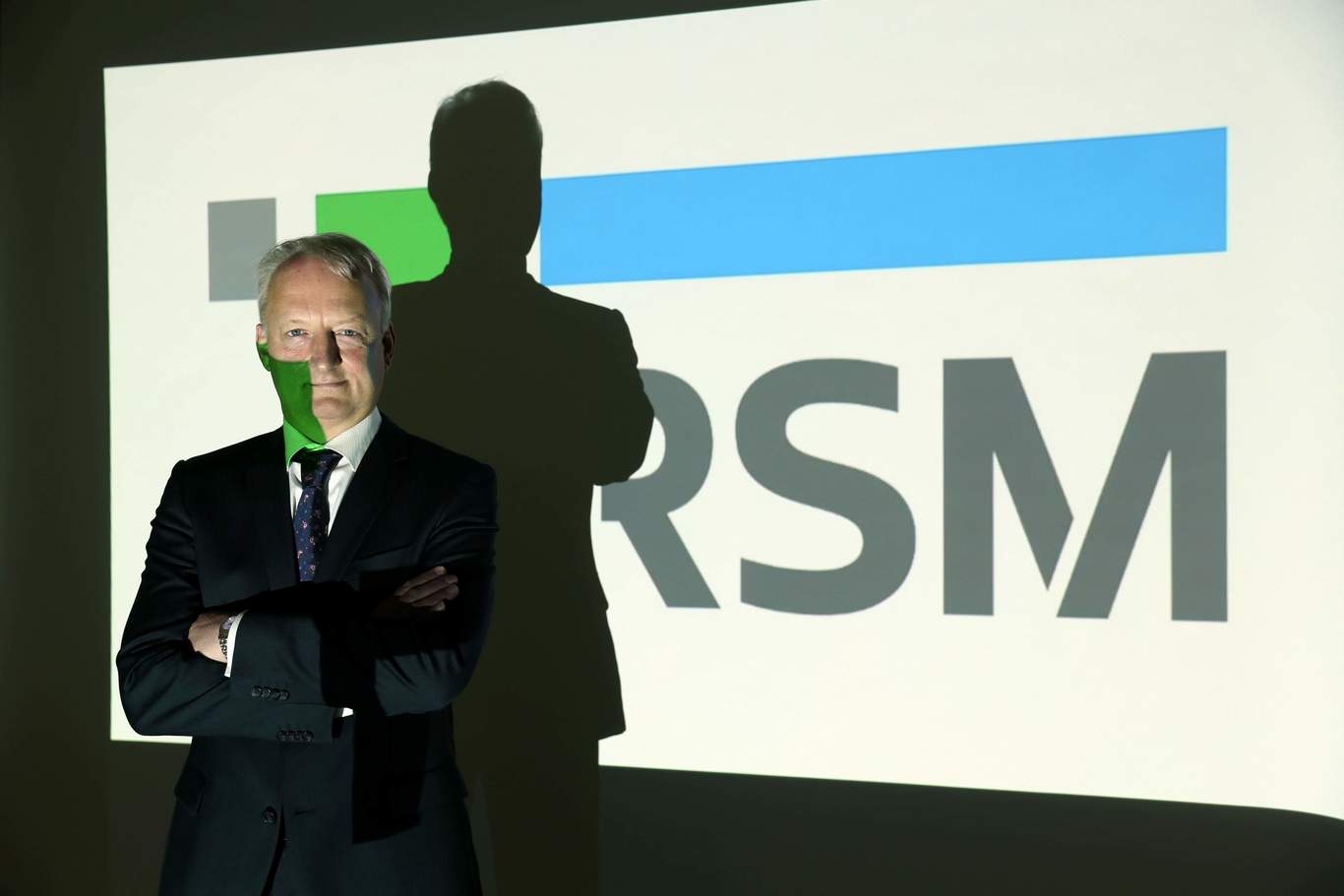How a five-man startup from Dublin became part of a giant €4 billion network
As part of our weekly How My Business Works series we profile RSM Ireland.
WHILE HE WAS happy that she was making her own way in the world, seeing his daughter off on her flight to New York was one of the hardest things John Glennon ever did.
“I was delighted that she had the confidence to go off on her own (but) it was one of the most emotional days of my life, it brings you back to when she started school,” he tells Fora.
“Your job is done and you would be afraid the she could meet someone over there and never come back.”
The situation is made a bit better by the fact that Glennon will have an excuse to fly across the pond several times a year. His accounting firm, which is older than his children, recently linked up with a giant €4 billion global network of companies called RSM which is based in the US.
“I’ll be able to visit her, I’ll be able to go over to the US about three or four times a year. It won’t always be to New York but I’m sure that I’ll get to see her.”
Although it has now given him an excuse to visit his daughter, Glennon had some reserves about linking up with RSM at first.
The married father of two built up his own firm, Baker Tilly Ryan Glennon, over nearly three decades. While the partnership with RSM gives him access to the network’s vast global system, Glennon admits that he feels he was giving up a part of his identity in the process.
“We made the decision to join in October 2015 after a rebrand was done where all of the global firms, 120 with 40,000 people, would move to a single global brand. I admired the ambition that decision reflected,” he says.
“It was a question of making a hard business decision. It was either giving up a brand with my name on it or joining what I believe will be a leading brand across the world.”
The 56-year-old Offaly native opted for pragmatism over sentiment and joined RSM, a network of independent audit, tax and advisory firms that has 760 offices employing 38,300 people and a combined income of over €4 billion. He now has hopes to dramatically expand the business that he has spent most of his life building up.
What do you do and how long have you done it for?
While its role has expanded throughout the years, Glennon’s company has essentially done the same thing since the late eighties; provide audit, tax, consultancy, and pretty much any service that a small or medium business wants.
After finishing secondary school in, Birr, Offaly, and a commerce degree in Galway, Glennon went to work for one of the ‘Big 4′ accounting companies (he is very mysterious and won’t say which one).
“After I left I went to a medium-sized firm and after a while was faced with a choice. I could have gone into the industry (but) I always had a desire to set up my own business. I wanted to be in control of my own future,” he says.
Glennon co-founded Ryan Glennon in 1987 at 28 years old with Liam Ryan, setting up with five people in Dún Laoghaire, Dublin. They had chosen one of the worst times in modern Irish history to set up a new business.
“It was very difficult. If people now think the recession was bad, the GDP now is multiples of what it was in the eighties,” he says.
A combination of poor governance at home as well as economic problems abroad contributed to possibly the most severe recession since the foundation of the state for almost the entirety of the decade.
Unemployment was consistently in the double digits and by the end of the 10-year period nearly a third of college graduates were emigrating.
“Most of the time we were advising companies that were tinkering on extinction,” Glennon says. “There was very little support and we did a lot of the works ourselves, hands on, working long hours and weekends.”
The company survived the recession only to be hit by another one 20 years later, but at this stage the firm was in better shape.
 Queues outside the social welfare office in Dublin in 2009. Glennon has had to contend with two major recessions.
Queues outside the social welfare office in Dublin in 2009. Glennon has had to contend with two major recessions.
It had recently merged with a rival and joined the international Baker Tilly network to create Baker Tilly Glennon Ryan.
Now based in Ranelagh with operations in Laois and Glennon’s hometown of Birr, it went from employing about 20 people to 70 in the space of four years.
Glennon went to the US to try and tempt prospective clients to set up shop in Ireland. “We took a lot of clients here as small companies, helped them set up and then they grew bigger,” he says. “It took us about three years but we reaped the benefit and it is what led us to RSM.”
Last year the company linked up with the international chain of accountancy firms that makes up RSM, re-branding as RSM Ireland and looking abroad for new opportunities.
What are your costs and how do you make money?
The company’s operations are split up into two main arms. Audit and tax services, which are responsible for about a third of its revenue, and management and consulting, which makes up the rest.
The first category is where RSM makes sure that companies are complying with their financial obligations, such as paying the correct amount of VAT. Glennon explains that the area, which can make a huge difference to businesses, has become much more specialised.
“I find now that it isn’t even enough to say that you are a tax specialist because something like VAT is a whole specialism by itself,” he says.
“I have a client who was told that their product was liable for VAT at 23%, but we won an appeal which said it was liable for 0%. That had a dramatic effect on that person’s business and it took a VAT nerd to win that case.”
The consulting arm is where RSM gets its staff to give advice to businesses to sort out any issues that they may have. Consulting areas can vary hugely so RSM focuses on specific types such as giving advice on property deals or on technology. Glennon says that the firm tries to take a ‘people-focused’ approach.
 RSM Ireland managing and founding partner John Glennon
RSM Ireland managing and founding partner John Glennon
“When the crisis hit if someone said ‘what do I do to reverse my profit decline’ and if you took out a spreadsheet and said ‘Cut costs by €1 million’, you’re not really resolving the issue,” he says.
He says that instead RSM tries to work with firms on an individual basis to try and improve their underlying business.
Like other audit and tax companies, RSM does not have to publicly file all of its financial information, meaning that it is hard to gauge exactly how well it is performing.
A company called Baker Tilly Glennon Ryan Ltd made a profit of about €300,000 last year, but Glennon says that this represents just a fraction of the firm’s total operations. He says that the company is profitable, although he does not give figures, with about 130 staff and turnover of €16 million in 2015.
What is your market?
RSM is pitched at the mid-range market rather than going after big multinationals like Google or Facebook.
It focuses on international companies a notch below the giants, such as the Irish-arm of German electronics maker Sennheiser, while its roster of indigenous Irish clients “are family-owned businesses with a mix of everything”.
 RSM Ireland works with Sennheiser, which is best known for its headphones
RSM Ireland works with Sennheiser, which is best known for its headphones
“We target the people that run businesses instead of the businesses themselves like if the Big 4 were to target Apple,” Glennon says.
“We would have a bias to companies in life sciences and technology and we would also have some charities and not-for-profit businesses.” He adds that the company would also do a lot of consultancy work for the state.
As for where the companies are located, Glennon says that the bulk of the Irish clients are from Dublin and the Midlands.
For international customers most of RSM’s work comes from either the US, UK or Germany, although Glennon says that the firm is looking to have a crack at moving into China.
“China is an emerging part of RSM Ireland, we had 20 partners come over to meet us recently and we got one from Hong Kong to set up in Ireland mostly because one of our employees spoke Mandarin,” he says.
What is the competition?
In the accounting and professional services industry, pretty much everyone is up against the same ‘Big 4′ global giants; PwC, Deloitte, EY and KPMG.
The same four companies dominate the market in Ireland, with fee income topping €1 billion last year, and hoover up most of the tax and audit business from big multinational companies.
While RSM bumps heads with the four every now and again, they are not the main source of competition. ”
“We have a laser focus on mid-market companies. Someone like Grant Thornton is looking to take on the Big 4, we aren’t,” Glennon says.
 KPMG is one of Ireland's biggest accounting companies
KPMG is one of Ireland's biggest accounting companies
Instead of the top companies, RSM’s main competition is numbers six through 10 on the top 10 list. RSM itself is eighth with fee income of €16 million, although there is a fairly significant gap between it and its next nearest rival, Mazars, which has turnover of about €30 million.
Glennon says that the link up with the RSM network should help the firm bridge some of that gap. As part of the deal all RSM companies, while they remain in their original ownership, share resources such as common systems and training.
“We also have Irish desks in the UK and the US which are dedicated to developing joint opportunities between the firms,” Glennon says.
“The challenges of globalisation need to be responded to in a globalised way. We have ambitious clients so we must be able to deliver global services.
“If you want to export to somewhere like Portugal, we might not know a lot about Portugal but we’ll know someone who does.”
What is your vision for the company?
After weathering the financial crisis alongside many of his clients, Glennon is hoping that the link up with RSM can push his business to the next level.
“We are looking to grow by 50% in the next three to four years which will be a combination of organic growth and non-organic growth,” he says.
Accountancy companies tend to be fond of merging, as evidenced by some of their spectacularly long names. Glennon doesn’t rule it out, saying that his goal is to keep growing the business however he can.
For himself, in the immediate future he is happy doing what he is doing, adding that he has gotten a boost from the more international element of the job.
“In the last three to four years my career has had much more of an international element which I enjoy, it’s how you develop, from interacting with other people,” he says. “I spent five hours with the CEO of RSM US, you learn a lot talking to guys like him.”
At the very least the travel gives a father an excuse to make the odd trip across to the Big Apple.






